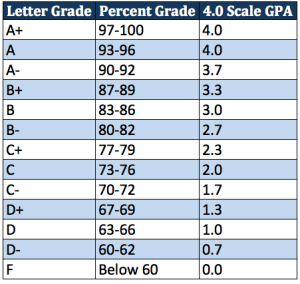 In high school, I heard a terrible story that made me scared of both severe procrastination and overloading my schedule.
In high school, I heard a terrible story that made me scared of both severe procrastination and overloading my schedule.
The story goes that this girl was an extremely bright student at an Ivy-caliber college. She studied so hard for top grades and was president of two clubs in high school, and then studied even harder and had an outstanding resume in college.
It looked like she would have the world at her hands after school.
Then, during her junior year, the assignments poured on, the extracurricular responsibilities built up, and her stress to be perfect crippled her. One day, after trying to do everything at an excellent level, she became so overwhelmed that she did nothing. She procrastinated to the point where she had a nervous breakdown.
The breakdown was so bad that her parents checked her into a mental hospital. No one could believe what had happened.
Relevant Application And Keywords
What was it that brought this former college all-star to a terrible low point? Well, I don’t know for sure, but there are some likely causes of severe procrastination that affect many students and may have affected this girl.
First, let’s make sure we are clear on the issue. Severe procrastination is different than regular procrastination. Everyone struggles with some form of regular procrastination because we enjoy comfort and entertainment, which school work requires us to leave. For example, putting off a reading assignment during the day, to do it later at night is not a big deal and is only a slight degree of procrastination.
But, students with severe procrastination are at the point where they miss a paper deadline and struggle to turn it in two days later. They take their exams without studying. They are constantly asking for extensions and giving excuses for incomplete work. And when it’s really bad, they don’t even submit their paper or show up for the exam, because they literally can’t get over the task of starting the work.
How Severe Procrastination Happens
If what you’re doing and studying isn’t what you want to pursue in your career, then the work in your major will start to seem pointless and a waste of time. If you can never start an assignment because of the deep anxiety about the class or doing this kind of work in your future, then you should reconsider your major and plans.
With these kinds of negative thoughts, you will—and it is natural to—procrastinate as long as you can to avoid being depressed about your situation. No one wants to feel like crap, and if it’s a choice between doing school work that makes them feel really bad or not, they will choose anything else.
Another scenario that causes dangerous severe procrastination is simply having too much on your plate. I knew a college student with a packed schedule, who was so frustrated that he could never get everything done each day.
When I asked to see a list of every activity, literally everything from eating, showering, and sleeping for the five-day week, the hours totaled 126 hours out of a possible 120 hours. No wonder this guy was stressed out and having a miserable time trying to fit everything in.
And there are also mental diseases like depression that are sometimes out of a person’s control, which deplete any motivation.
Methods To Stay Motivated And Avoid Severe Procrastination
Look at your end goal first and find what you want to do in life. Only then should you work backward and find what major will help you develop or is necessary to get there. This is also a great way to ensure that your workload is somewhat interesting and serves a greater purpose, which decreases the what-is-the-point mentality that leads to procrastination.
Be selfish in what you do and don’t do. It’s obvious, but you won’t be happy if you always try to please others to take on work you don’t find interesting. Social pressures are everywhere if you listen to them.
Your parents, friends, teachers, or advisors can say what they believe is best for you, but no one knows you as much as yourself. You can even tell them studies show people have more energy and more success in doing what they enjoy.
Who cares if you go to a top 20 business school, if you have no desire to study business and work in finance, accounting, management, or marketing? Who cares if your dad wants you to be a doctor because he regrets not going to med school, but you can’t stand science? Why would you torture yourself through a major that you don’t enjoy, because it is practical for getting a job—which you also wouldn’t like?
If you’re selfish with your big decisions, then you’ll have free time to spend time with others.
Additionally, don’t double major or double minor to try and impress companies or grad schools. It is so rare that you will legitimately use both majors in your future, or a major and multiple minors, that I almost want to be bold and say you should never do it. But, I won’t go that far.
Your hard class schedule or long list of memberships in societies for resume lines is not going to be that significant for your future, so it’s not worth it. Instead, try to focus on what you want to do after school and get as knowledgeable and experienced as you can in that field.
A couple outstanding accomplishments, whether an innovation, award, or scholarship, will do more for your resume and future than a packed schedule of mediocre achievements.
The key point in this entire post is if you can early on, by yourself, find your career interest, then you will completely avoid all the problems of severe procrastination. Once you’ve established your long-term goal, it simplifies the decision-making process related to commitments. All you have to do is determine whether or not it will help you get there, and you’ll know if you should invest your time and energy.
Specific Ways To Stop Procrastinating
The methods above apply to severe procrastination, but you can use these top tricks to stop the annoying, regular procrastination. This section deserves a blog post of its own.
1) Break down what you need to do. Breaking or outlining an assignment into smaller parts tricks yourself to think that the task is more manageable and easier than it really is. Once you finish a small task, move on to the next smaller task. How do you eat a whale? One bite at a time. (I hope you don’t think that was me trying to be funny.)
2) Stop trying for perfection. Don’t psyche yourself out with an unrealistic expectation of having the perfect idea or plan. This is especially true when writing a paper, because you could write a paragraph a thousand different ways.
3) Hangout with motivated people. Humans naturally try to be like those around them. That’s why friend groups have distinguishable accents, vocabulary, and other traits. The same is true for motivation. Find a group that is serious about their future, and you will naturally be more motivated.
4) Work in an environment where you can focus. The age-old quote “humans are a product of their environment” applies. Find a place where you can consistently get work done for two hours. If you’re not being productive in that area for some reason, get up and try a new location.
5) Ask someone to hold you accountable to finish a task. Shoot a text to a friend and tell them to call you at this time in the day to see if you completed it. When I tell someone what I want to accomplish in a certain time, I’m certainly motivated to do it so I don’t look like an idiot when they ask me later.
6) Reward yourself for making progress. Set a goal to focus for two hours, and if you actually do it, then eat Chipotle, go out with friends, or reward yourself some other way.
If you’re procrastinating and stressed out about college because you know it won’t help you get to where you want to go in life, check out this article.


